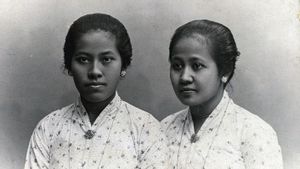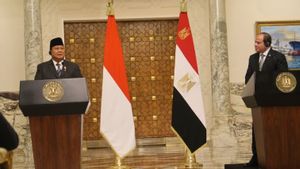The discourse about China's plan to help Indonesia develop rice fields in the Central Kalimantan (Central Kalimantan) region is becoming a public concern. Why should the government bother collaborating with China to plant rice?
This plan was revealed by the Coordinating Minister for Maritime Affairs and Investment Luhut Binsar Pandjaitan. He said China was willing to develop agriculture in Central Kalimantan by providing rice technology. The plan, this project will start in October 2024 with a land of 1 million hectares.
"We (Indonesia) ask them (China) to provide their rice technology, where they have been very successful in becoming self-sufficiency. They are willing," said Luhut as quoted by Antara.
This is one of the agreements from the fourth meeting of the RI-RRT High Level Dialogue and Cooperation Mechanism (HDCM) in Labuan Bajo, East Nusa Tenggara, Friday (19/4/2024). Luhut said this project is important because Indonesia is experiencing serious rice problems.
The Central Statistics Agency (BPS) reported that Indonesia's rice import volum in January 20204 reached 443 tons with a value of 297.2 million US dollars or the equivalent of Rp. 4.8 trillion (exchange rate of Rp. 16,222). This figure is an increase of around 82 percent compared to rice imports in January 2023 (year-on-year/yoy) which is only 243.66 thousand tons. In addition, the value also increased by around 135 percent (yoy).
Luhut emphasized that the realization of investment related to agriculture in order to realize food security is quite urgent to do. The hope is that collaboration with China in the field of research and agricultural technology and strengthening the quality of agricultural products, especially rice, can make Indonesia a food barn in the future.
What Luhut said was that the plan was to collaborate with China to develop agriculture in Central Kalimantan to spark attention from various circles. Agricultural experts say this plan has the potential to crop failure, while environmental observers are concerned about the potential for land damage.
Agriculture observer from the Indonesian Political Economy Association (AEPI) Khudori is not unsupporting technology transfer from China. However, he emphasized that cooperation between Indonesia and China, including in terms of supplying rice seeds from abroad, has the potential to fail.
The use of rice seeds from abroad to Indonesia is not always a good solution and can be directly applied. There are many things that need to be considered before this is done, ranging from weather or climate adaptation, different soil properties, and disease pests.
According to Khudori, this adaptation process is not known how long. In addition, planting seeds from abroad is also not necessarily successful due to several vals, including the difference in weather between Indonesia and China.
"Don't forget, China is a country with four seasons, while Indonesia is a country with two seasons. This difference will affect the character of cultivation, soil character, climate/weather behavior is also different," said Khudori in a written statement received by VOI.
"Experts in China can be champions in rice farming there, but when similar technology is implemented in Indonesia it doesn't necessarily work. This must be realized by policy makers," he added.
Farmers carry out a sundep pest control movement in Karawang, West Java. (Between/HO-Distan Karawang)
Khudori gave an example of the incident in 2007, when Vice President Jusuf Kalla visited China and thepincut of Chinese hybrid seeds. The Bamboo Curtain country is indeed famous for this, because there is a development and inventor of hybrid seeds, Yuang Longping. According to them, rice productivity can reach 16 tons per hectare using this hybrid seed.
Tempted by this claim, the Indonesian company collaborated with Chinese companies in the field of banking. However, according to Khudori, it was later discovered that the hybrid rice seeds imported and distributed as part of the seed assistance to farmers were not as expected.
In some hybrid rice places grown by farmers with diseases. This indicates that it is not easy to induce a farming system, one of which is seeds. There must be additional innovations. Disease resilience innovations, for example," explained Khudori.
Luhut's plan to develop rice fields has also received the spotlight of the Director of the Central Kalimantan Environmental Forum (Walhi) Bayu Herinata. According to Bayu, this plan threatens the peat ecosystem in Central Kalimantan.
In the aftermath, if the peat ecosystem is damaged, it can cause domino effects because it can result in loss of carbon reserves, water reserves to biodiversity.
"Lahan yang disiapkan secara besar-besaran akan merusak ekosistem gambut selain itu rice fields juga memerlukan sistem irigasi yang memerlukan lahan lebih luas," jelas Bayu.
According to Bayu, a number of areas in Central Kalimantan have practiced rice fields. However, the practices carried out such as thefood estate program in Gunung Mas and Pulang Pisau were not optimal.
SEE ALSO:
In addition to potentially damaging the environment and less profitable, the rice fields program is also feared to affect the social and culture of local communities. Bayu said that local people in Central Kalimantan implement food diversification, so that they can survive when facing climate change and extreme weather because they do not depend on one type of food.
"Local people have always proven to be able to survive with the farming system, the government should still use that method," he concluded.
The English, Chinese, Japanese, Arabic, and French versions are automatically generated by the AI. So there may still be inaccuracies in translating, please always see Indonesian as our main language. (system supported by DigitalSiber.id)


















